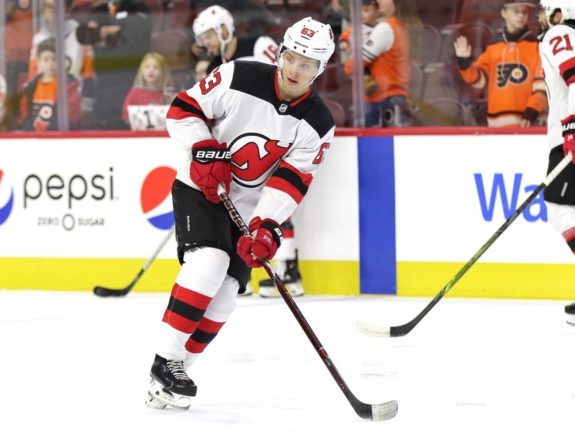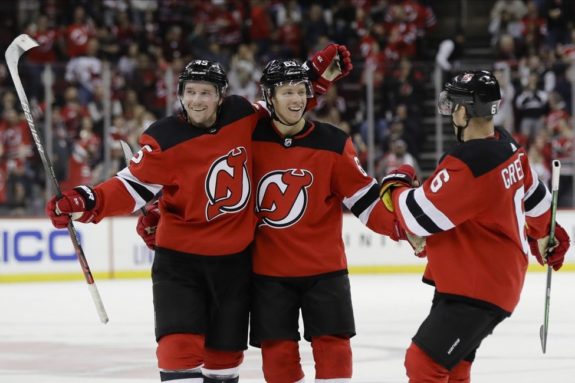It’s a new era for the New Jersey Devils. They no longer have their best player on the team, as they traded star winger Taylor Hall to the Arizona Coyotes in exchange for picks and prospects. It’s close to impossible to replace a player of his caliber, especially one who won the Hart Trophy just 18 months ago. But the Devils will have to find a way to make up some of the production they lose without him.

In the first few games without Hall, Jesper Bratt has found himself playing on the top line alongside Nico Hischier and Kyle Palmieri. It’s not the first time Bratt has been used on the first line, as he played plenty alongside Hall and Hischier in the past. But things are different without Hall, as the expectation is for Bratt to be a primary scoring threat. Can he produce consistently enough to stay in the top six?
Bratt Not Immune to Team Struggles
Bratt was an unheralded prospect in his draft year, with the Devils taking him in the sixth round (162nd overall) of the 2016 Entry Draft. He spent his plus-one draft season in Sweden’s second division, where he had 22 points in 46 games with AIK. But it wasn’t long before he made his NHL debut.
He was a training camp standout in 2017 and finished the season with 13 goals and 35 points in 74 games as a rookie. The following season saw him miss 31 games due to injury, but that didn’t mean he wasn’t producing. He finished with 33 points in 51 games, which comes out to a 53-point pace over 82 games.
But like many Devils this season, Bratt has underachieved. His scoring is way down, as he has only 10 points in 28 games, putting him on pace for 27 points. So why has his production seen such a dramatic dropoff?
| Stat | 2018-19 | 2019-20 |
| iCF/60 | 11.06 | 9.72 |
| Shots/60 | 7.67 | 6.48 |
| ixG/60 | 0.56 | 0.38 |
| Primary Assists/60 | 1.16 | 0.81 |
| Points/60 | 2.23 | 2.02 |
He may still be an efficient point producer this season (2.02 points/60). But all his individual rates — shot attempts per 60 minutes (iCF/60), expected goals per 60 minutes (ixG/60), primary assists per 60 minutes, and even his points/60 — have fallen off from 2018-19. The same is true of his on-ice impact, as his expected goal and shot attempt shares are around 44-45% (They were around 48-49% last season).
Related: Was Devils’ Return for Hall Good Enough?
Because he was struggling, former head coach John Hynes made Bratt a healthy scratch on a few occasions. And when he was in the lineup, he was relegated to fourth-line minutes alongside players like Miles Wood and Pavel Zacha. That isn’t the ideal scenario for Bratt, as he needs to be playing with other skilled players to succeed.
Bratt Coming Around After Coaching Change
It may have been a rough start to the season, but Bratt seems to have found some life since Hynes’ firing on Dec. 3. He has two goals and an assist in his last seven games, and he’s fired 13 shots on goal (he had just 24 shots on goal in 21 games under Hynes). With that said, the consistency still hasn’t quite been there, as he’s had three games without any shots on goal.
Even though his consistency needs to be better, Bratt has benefited from playing with the Devils’ two best remaining forwards in the post-Hall era, Hischier and Palmieri. The trio has a mixed bag of on-ice results — their shot attempt share is 40%, while their expected goals share is 51.31%.

But while their on-ice impact may not be the best, they’ve been generating quite a bit of offense. They’ve only played 25 minutes together at five-on-five but are averaging 2.88 expected goals for 60 minutes. It’s a small sample size, but the early returns are encouraging enough. So I’d expect interim coach Alain Nasreddine to give Bratt an extended run with Hischier and Palmieri.
That would be the best thing for Bratt moving forward, too. The Devils don’t have a ton of options to play on the top line without Hall. He’s shown he can play a first-line role in the past. And it also helps he has plenty of previous experience on a line with Hischier, who feels comfortable playing alongside Bratt.
Related: Devils Trade of Hall a Tough, Necessary Pill to Swallow
A lot of Devils have plenty to prove over the final 49 games of the season, but that’s specifically true for Bratt. He’ll be a restricted free agent this summer, and what type of contract he gets could depend on how well he plays. He’s shown flashes of being a top-six winger but hasn’t been consistent enough to remain there. He’ll have no better opportunity than he does now to show he can be a strong top-six forward. And the Devils would benefit from that heading into summer and the 2020-21 season, as it’d give them one less need to address.
* * *
Advanced stats from Natural Stat Trick